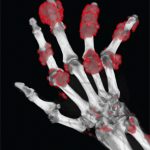At the time of analysis, 10 patients had completed treatment, three had discontinued the study, two had met the serum urate monitoring rules at two consecutive visits but had discontinued pegloticase, and five patients continued to receive pegloticase therapy. At week 24, no notable changes to eGFR were identified. Also at week 24, in the 10 patients who had completed pegloticase treatment, HAQ-pain and HAQ-DI scores improved by 26.7±30.3 (baseline: 35.9±30.2) and 0.2±0.5 (baseline: 1.0±1.0), respectively.
Seven serious adverse events occurred in five individuals. These reactions included atrial fibrillation, cellulitis (N=2), diverticulitis, duodenal ulcer, localized infection and sepsis. These reactions were deemed unrelated to pegloticase administration. No anaphylaxis or infusion reactions occurred.
The use of pegloticase in kidney transplant recipients to reduce serum uric acid levels without affecting renal function is beneficial. The preliminary data presented herein show promising results in these patients, who often have high levels of serum uric acid and symptomatic gout despite prior treatment with uric acid-lowering agents, either due to intolerance or ineffectiveness.
Michele B. Kaufman, PharmD, BCGP, is a freelance medical writer based in New York City and a pharmacist at New York Presbyterian Lower Manhattan Hospital.
References
- Abdellatif AA, Kin Z, Peloso P, et al. Pegloticase for uncontrolled gout in kidney transplant recipients: Provisional data report of a multicenter, open-label, efficacy and safety study [abstract PO2117]. Presentation. American Society of Nephrology. 2021 Nov 4.
- BLA Approval. BL 125293/0. (Pegloticase (Krystexxa) injection FDA approval letter.) U.S. Food & Drug Administration. 2010 Sep 14.
- Highlights of prescribing information: Pegloticase (Krystexxa). U.S. Food & Drug Administration. 2016 Sep.


